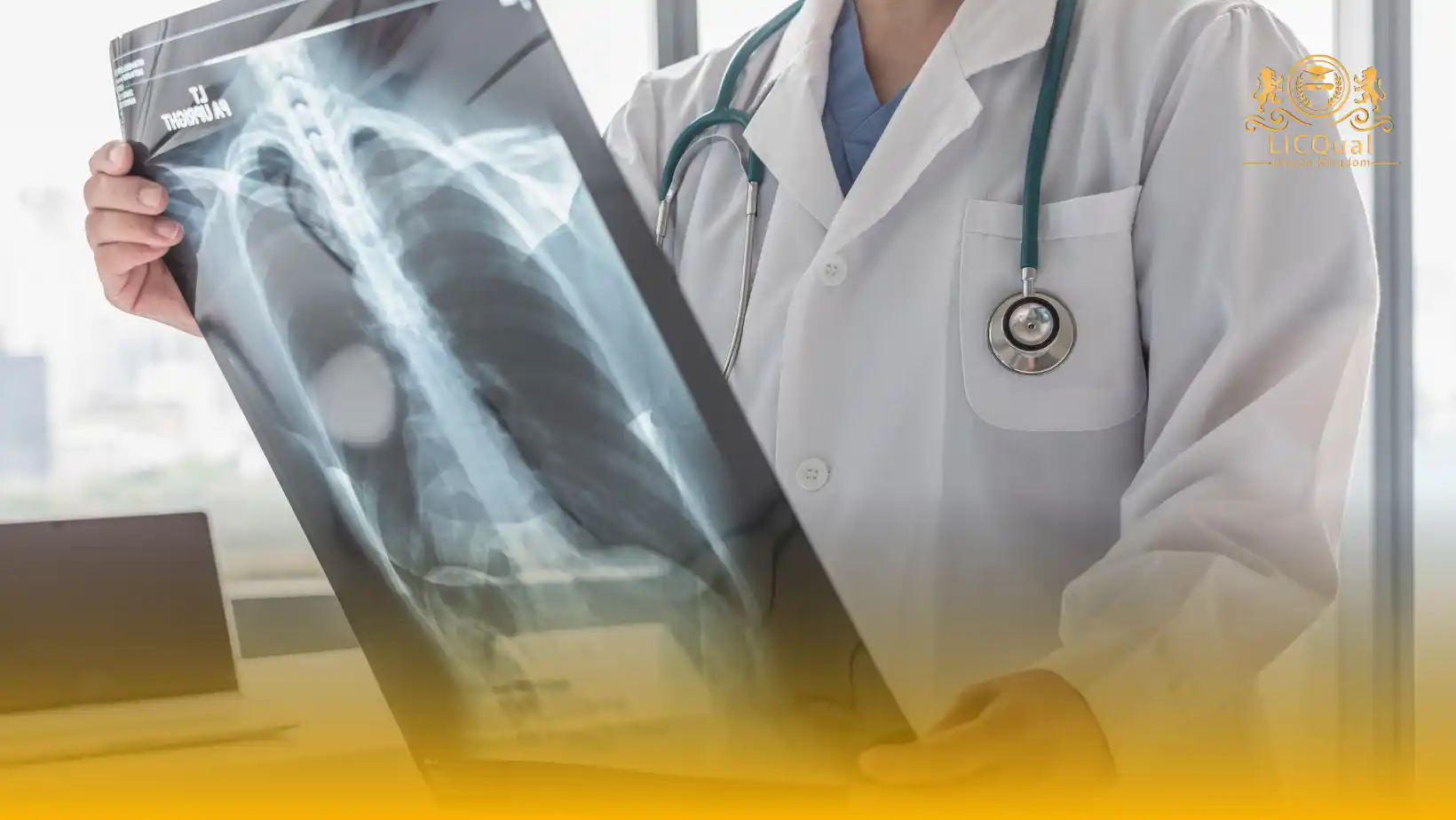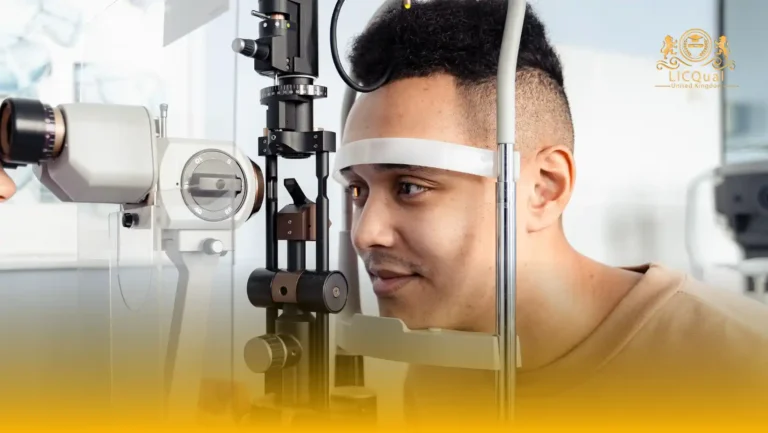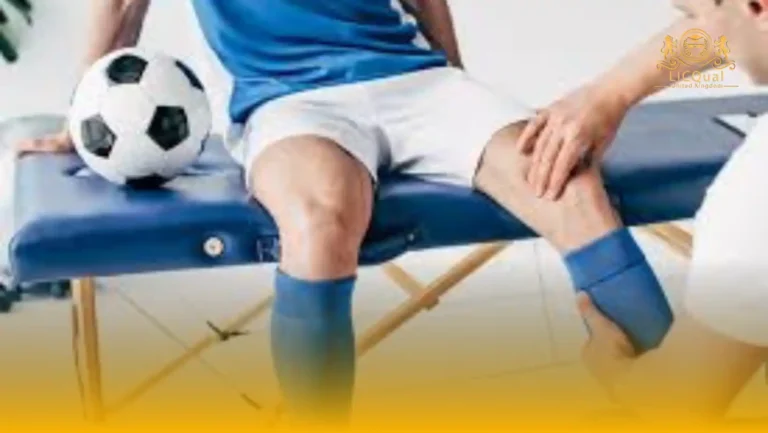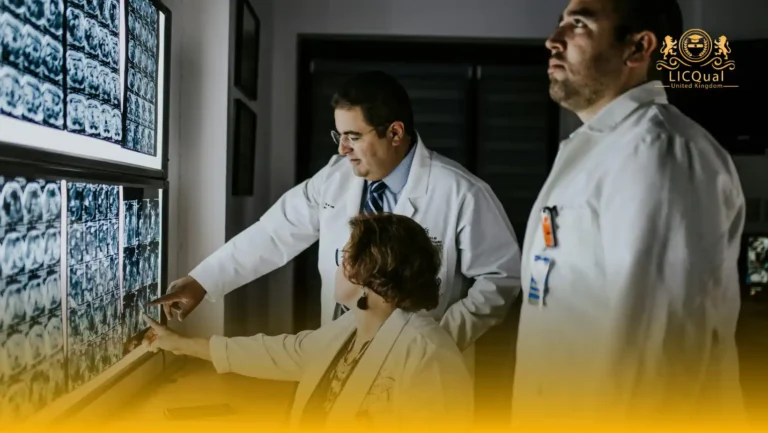The LICQual Level 6 Diploma in Radiology (Dip RD) is an advanced qualification designed for healthcare professionals seeking to specialise in diagnostic imaging and radiological practice. This course is intended for learners who already have a clinical or healthcare background and wish to enhance their career prospects, expand their knowledge, and advance their Continuing Professional Development (CPD). It is not suitable for fresh candidates but for professionals committed to excellence in radiology.
This diploma provides learners with comprehensive knowledge of medical imaging techniques, radiological equipment, diagnostic procedures, and the safe interpretation of imaging results. Learners will develop both theoretical understanding and practical skills, enabling them to perform advanced imaging procedures, evaluate findings accurately, and support effective clinical decision-making in a variety of healthcare settings.
Centres delivering this qualification are required to uphold the highest standards of education and training. This includes employing competent and qualified staff and providing learners with access to all necessary resources, imaging equipment, and learning materials to ensure successful outcomes. By maintaining these rigorous standards, centres ensure learners receive a high-quality educational experience, gaining the confidence, expertise, and professional credibility required to excel in radiological practice.
Completing the LICQual Level 6 Diploma in Radiology allows learners to demonstrate advanced professional competence, strengthen practical and diagnostic skills, and achieve recognised credentials that reflect both dedication and expertise in medical imaging and radiology.
Course Overview
Qualification Title
LICQual Level 6 Diploma in Radiology (Dip RD)
Total Units
6
Total Credits
120
GLH
480
Qualification #
LICQ2200917
Qualification Specification
To enroll in theLICQual Level 6 Diploma in Radiology (Dip RD) , applicants must meet the following criteria:
|
Qualification# |
Unit Title |
Credits |
GLH |
|---|---|---|---|
|
LICQ2200917-1 |
Advanced Radiological Anatomy and Physiology |
20 |
80 |
|
LICQ2200917-2 |
Radiological Pathophysiology |
20 |
80 |
|
LICQ2200917-3 |
Diagnostic Imaging Techniques and Modalities |
20 |
80 |
|
LICQ2200917-4 |
Evidence-Based Radiological Practice and Patient Management |
20 |
80 |
|
LICQ2200917-5 |
Professional Practice, Ethics, and Radiology Governance |
20 |
80 |
|
LICQ2200917-6 |
Clinical Case Studies and Applied Radiology Practice |
20 |
80 |
By the end of this course, learners will be able to:
Unit 1: Advanced Radiological Anatomy and Physiology
- Demonstrate comprehensive knowledge of human anatomy relevant to diagnostic imaging.
- Explain physiological functions and their relevance to imaging interpretation.
- Analyse correlations between anatomical structures and radiological findings.
- Integrate anatomical and physiological knowledge into clinical imaging practice.
Unit 2: Radiological Pathophysiology
- Explain the pathophysiology of common and complex conditions visible through imaging.
- Analyse the progression and radiographic manifestations of acute and chronic diseases.
- Evaluate systemic and localized conditions affecting diagnostic outcomes.
- Apply pathophysiological knowledge to support accurate radiological interpretation.
Unit 3: Diagnostic Imaging Techniques and Modalities
- Demonstrate advanced understanding of X-ray, CT, MRI, ultrasound, and nuclear medicine principles.
- Operate diagnostic imaging equipment safely and effectively.
- Select appropriate imaging protocols for diverse clinical scenarios.
- Integrate findings from multiple imaging modalities to support clinical diagnosis.
Unit 4: Evidence-Based Radiological Practice and Patient Management
- Develop patient-centred imaging protocols aligned with clinical needs.
- Apply risk management principles, including radiation safety and patient protection.
- Utilise evidence-based practice to inform clinical decision-making in radiology.
- Communicate imaging results effectively and collaborate with multidisciplinary teams.
Unit 5: Professional Practice, Ethics, and Radiology Governance
- Apply legal, ethical, and professional principles in radiological practice.
- Maintain patient confidentiality, informed consent, and safety in all procedures.
- Implement clinical governance procedures, audits, and quality assurance measures.
- Engage in Continuing Professional Development (CPD) to maintain professional competence.
Unit 6: Clinical Case Studies and Applied Radiology Practice
- Analyse complex radiological case studies to enhance diagnostic reasoning and problem-solving.
- Apply theoretical knowledge to practical imaging scenarios safely and effectively.
- Critically evaluate diagnostic findings and assess accuracy of interpretation.
- Reflect on clinical practice to improve professional competence and patient care outcomes.
The LICQual Level 6 Diploma in Radiology (Dip RD) is designed for healthcare professionals who want to specialize in diagnostic imaging and radiological sciences. This internationally recognized qualification is ideal for doctors, nurses, and practitioners seeking advanced knowledge in radiology, imaging technologies, and patient-centered diagnostic care. Whether you aim to progress in your current role, move into private practice, or strengthen your academic profile, this accredited radiology diploma provides the skills, credibility, and recognition to achieve your career goals.
1. Medical Doctors and Physicians
- Gain advanced expertise in diagnostic imaging and radiology
- Strengthen clinical decision-making with evidence-based approaches
- Enhance professional credibility with a Level 6 radiology diploma
- Expand opportunities in hospitals, clinics, and private practice
- Stay updated with the latest imaging technologies and guidelines
- Build a pathway toward postgraduate study or specialization
2. Radiographers and Imaging Technologists
- Develop specialized skills in advanced imaging modalities
- Improve confidence in managing CT, MRI, and ultrasound procedures
- Earn an accredited radiology diploma recognized internationally
- Support multidisciplinary teams with advanced imaging knowledge
- Increase career opportunities in diagnostic imaging departments
- Deliver better patient outcomes through structured training
3. Nurses and Allied Healthcare Professionals
- Strengthen knowledge of radiology to support patient care
- Gain confidence in assisting with diagnostic imaging procedures
- Add value to multidisciplinary healthcare teams with specialized skills
- Improve patient communication and safety in radiology settings
- Enhance career progression with an accredited qualification
- Build expertise in radiation safety and patient-centered care
4. International Medical Graduates
- Obtain a qualification recognized in the UK, Middle East, and Asia
- Strengthen professional profiles for global healthcare careers
- Meet international accreditation and healthcare standards
- Gain credibility for advanced clinical roles abroad
- Access flexible online study while working internationally
- Build a competitive edge in global healthcare markets
5. Professionals Seeking Private Practice Opportunities
- Acquire specialized radiology skills for independent practice
- Increase patient demand with accredited qualifications
- Offer advanced diagnostic imaging services in private clinics
- Build a reputation as a trusted radiology practitioner
- Expand earning potential through specialized expertise
- Position yourself as a leader in diagnostic imaging care
6. Academic and Research Professionals
- Strengthen academic credentials with a Level 6 radiology diploma
- Contribute to radiology research and publications
- Gain structured knowledge aligned with global standards
- Support teaching roles in medical and healthcare education
- Enhance credibility in academic and professional networks
- Build a pathway toward higher-level qualifications and research
7. Career Changers within Healthcare
- Transition into radiology from other medical specialties
- Gain structured training to build new expertise in imaging sciences
- Access flexible study options while maintaining current roles
- Earn a qualification that supports career mobility
- Open doors to new opportunities in radiology and diagnostic medicine
- Build confidence in delivering patient-centered radiology services
To deliver the LICQual Level 6 Diploma in Radiology effectively and ensure high-quality learner outcomes, centres must meet the following requirements:
- Qualified and Experienced Staff: Centres must employ competent and certified instructors with professional experience in radiology, diagnostic imaging, and advanced clinical practice.
- Training Facilities: Centres should provide well-equipped classrooms and clinical imaging areas suitable for both theoretical instruction and practical demonstrations.
- Access to Imaging Equipment and Learning Resources: Learners must have access to all necessary diagnostic tools, radiology equipment, and reference materials to complete practical and assessment components successfully.
- Health and Safety Compliance: Centres must adhere to current health, safety, and hygiene regulations, ensuring a safe environment for learners and staff.
- Assessment and Learning Support: Centres must provide comprehensive learning materials, assessment tools, and guidance, supporting learners in achieving competence and completing the qualification successfully.
- Continuing Professional Development (CPD) Support: Centres should facilitate learners’ ongoing professional growth by providing CPD opportunities aligned with best practices in radiology and diagnostic imaging.
- Quality Assurance and Monitoring: Centres must maintain robust quality assurance systems to monitor training delivery, learner progress, and overall programme effectiveness.
Meeting these centre requirements ensures learners receive high-quality education, practical experience, and professional support, preparing them to excel in radiology and achieve recognised professional qualifications.
Assessment and Verification
All units within this qualification are subject to internal assessment by the approved centre and external verification by LICQual. The qualification follows a criterion-referenced assessment approach, ensuring that learners meet all specified learning outcomes.
To achieve a ‘Pass’ in any unit, learners must provide valid, sufficient, and authentic evidence demonstrating their attainment of all learning outcomes and compliance with the prescribed assessment criteria. The Assessor is responsible for evaluating the evidence and determining whether the learner has successfully met the required standards.
Assessors must maintain a clear and comprehensive audit trail, documenting the basis for their assessment decisions to ensure transparency, consistency, and compliance with quality assurance requirements.







